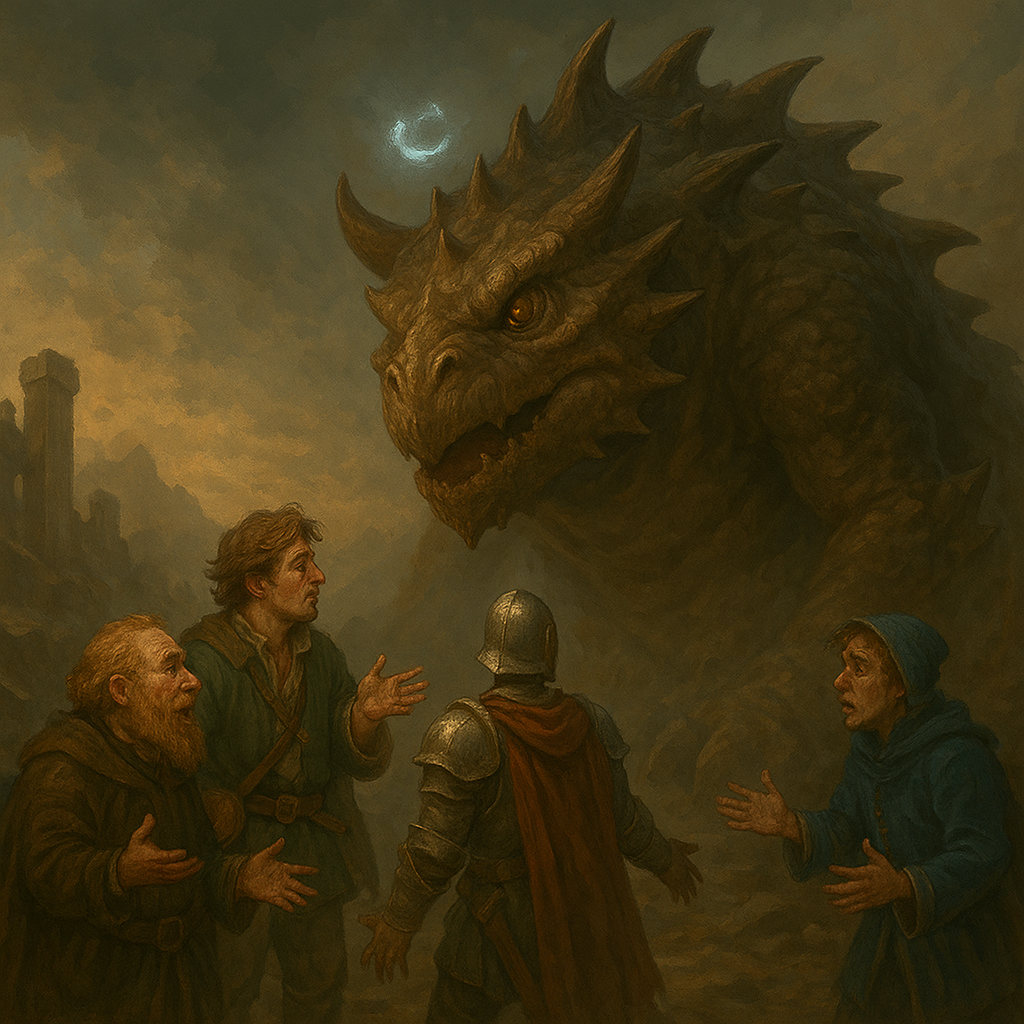When They “Guess” Everything Too Right — And Yer Monster Manual’s Under Siege
“By Trickin’s cursed coin purse, that ain’t natural — he’s rolled five crits and guessed the troll’s regen weakness? Somethin’ stinks worse than a mimic’s breath.”
There’s always one. A player who suddenly knows just enough about every monster, every trap, every ancient relic ye throw their way. No perception checks, no in-game lore rolls — just “Oh, I think trolls are weak to fire, right?” as if their character grew up readin’ bestiaries and battlin’ ogres in their dreams.
I once threw a homebrew aberration at me table. No name, no lore, just teeth and screams and one long spine like a cursed chimney sweep. And wouldn’t ye know it — the warlock says, “That’s probably vulnerable to radiant.” Radiant! The thing lived in shadow caves and fed on dwarven guilt! But aye, he guessed right. Or more likely, he cheated.
Now, maybe yer players aren’t cheatin’. Maybe they’ve just played too much. Maybe they genuinely remember troll weaknesses, gelatinous cube behavior, and the mating patterns of beholders. Still — when that knowledge leaks into the table without filter, it kills the tension faster than an anti-climax trap on a mimic’s chest.
So here’s how to shut down the metagame without shuttin’ down the fun.
They’re Playin’ the Book, Not the World — And That’s a Problem
👉 If yer monsters feel like open books, it’s time to rewrite the rules. There’s a scroll of tricks awaitin’ on the GM Wisdom shelf, and if ye need some custom curse ideas to rattle a rules lawyer, I’ve got a few stored in the cursed contact scroll. Just don’t sign yer real name. You’ve been warned.
How to Stop Metagaming From Killing Yer Encounters
1. Change the Damn Monsters
Don’t be afraid to mess with stat blocks. Give yer trolls acid weakness instead of fire. Let yer vampires love garlic. Turn a mimic into a wall. And if yer player whines, just say:
“This ain’t yer uncle’s Monster Manual, lad. This one was raised in the Undercrawl.”
Need some inspiration? Look at The Dagger That Hates the Sun — it looks like a cursed relic, but it’s somethin’ far more dangerous than what the player expects.
2. Hide the Monster’s Identity
Don’t say “You see a troll.” Say:
“A gangly brute, covered in sores, skin stretchin’ over misshapen bones, eyes wild like a cave lizard on fire.”
Let them guess — but guess wrong.
3. Ask For In-World Justification
If they say, “It’s weak to fire, right?” respond with:
“How would your character know that?”
Make ‘em roll. Make ‘em think. If they flub the roll, maybe they confuse it and waste a round. Maybe the “fire weakness” angers it.
Use this tip with subtlety, like the way The Tiefling Who Was Never Really There blurs the line between what’s real and what’s remembered.
4. Change the Behavior, Not Just the Stats
Even if it is a beholder, let it stalk like a hunter, not a floating death-eye. Let it talk. Let it surrender. Shake up the encounter rhythm so they can’t fall back on pattern memory.
For strange behaviors done right, peek at Serynthelzaaz, The Hollow Bloom — nothin’ about that creature is what it seems.
5. Confront Repeat Offenders With a Smile
If a player keeps breakin’ immersion with out-of-character guesses, don’t slam ‘em with a hammer. Just raise yer eyebrow (real or drawn) and say:
“Funny how yer fighter remembers that ancient elven glyph he never studied. Care to explain, lad?”
You’ll only have to say it once.
When Monsters Stop Being Scary, The Game Stops Breathin’
👉 A good mystery monster makes players sweat — not yawn. Head back to GM Wisdom if yer table’s startin’ to feel like a handbook review session. Or if yer group needs a reminder about roleplay boundaries, have ‘em read If No One Trusts Ya, That’s Not a Roleplay Choice — That’s a Problem. It might rattle a few scrolls into place.
Other Scrolls Worth Yer Time
FAQ
Q: Is metagaming always bad?
A: Not always. But when it replaces character choices with player memory, yer steppin’ on the game’s throat.
Q: Can I punish players for metagaming?
A: Not directly — but twist the world so their “knowledge” betrays ‘em. It’s more fun that way.
Q: What if everyone at the table knows the monster?
A: Then change the story, not the stats. Make the threat emotional, not encyclopedic.


